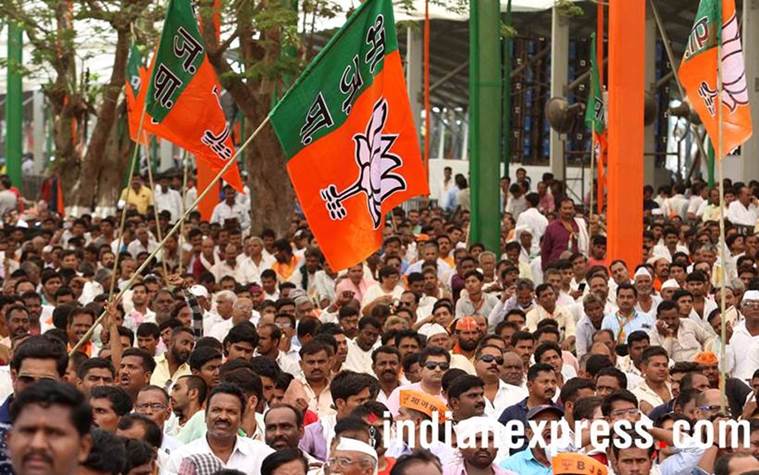 (Express Photo by Prashant Nadkar/Files/Representational)
(Express Photo by Prashant Nadkar/Files/Representational)
As Prime Minister Narendra Modi addressed a rally in Mangaluru on Saturday, what would have weighed on the mind of local leaders in this coastal Karnataka region was simmering caste tensions within its core Hindutva brigade.
Since the announcement of candidates for the eight Assembly seats in Dakshina Kannada district and five in Udupi last month, a banner of rebellion has been raised by the backward-caste Billava community, the largest in the region at over 30 per cent of the population, who also make up the mass of foot soldiers in Sangh Parivar groups. Dakshina Kannada is considered the laboratory of the BJP’s Hindutva brand of politics, and a former citadel of the party.
The BJP has given a ticket to only one Billava community member in Dakshina Kannada and Udupi each, while giving six to Bunts and two to Brahmins. The Billavas, who feel the BJP has denied them political opportunities since it formed a government in Karnataka in 2008, see it as another sign of the hold of the two upper-caste groups in the party.
The Bunts (agricultural landholders) and Brahmins are far behind in numerical strength in coastal Karnataka compared to the Billavas, who are nearly 50 per cent in some constituencies. BJP leaders are worried the Billava anger will hit party prospects in at least five seats of Dakshina Kannada in the May 12 elections.
Billava leaders also accuse the BJP of favouring “new entrants more inclined to business than commitment to Hindutva ideology”. Campaigns have been on, including online, on this “shortchanging” of the Billava community by the party.
Says a Billava leader and a long-standing worker of a radical Hindutva group in Dakshina Kannada, “There is a silent tsunami building up against the injustice meted out to the community and its leaders by the BJP. The community ignored injustices in the past, but this time there is a resolve to send out a message.”
He adds, “We are the ones who fight for the Hindutva cause on the streets, we are the ones who get stabbed, go to jail, face trials in courts. They just manage the show and get the tickets. What justice is this?”
Among the key triggers for the Billava anger is the denial of a ticket to veteran Hindutva activist Satyajit Surathkal, 48, considered a contemporary of Union minister Anant Kumar Hegde in right-wing activism in Karnataka. The former Hindu Jagaran Vedike leader was widely tipped to contest the Mangalore North constituency, where the Congress’s Moinuddin Bawa is the sitting MLA, but was passed over by the BJP for a young dentist and former JD(S) leader, Bharath Shetty.
Surathkal, who had been at the forefront of protests over the killing of RSS worker Sharath Madivala in Bantwal last August, had initially threatened to contest as an Independent. Having taken a backseat since, he told The Sunday Express, “I am staying silent. Some assurances have been made.”
But Billava leaders warn that come poll day, the community would speak with its vote. “A decision has been taken to ensure the defeat of the BJP. The thinking in the ranks is that we have the Hindutva plank and we can rebuild our constituency again, but the true worth of leaders involved in the injustice will be proven in a BJP defeat,” says a veteran Hindutva leader.
A Facebook campaign by a group called the ‘Dakshina Kannada Billava Nota Campaign’ is calling on Billavas to press the NOTA button on May 12.
M Veda Kumar, the leader of a Billava association, says, “Based on the population of the community, political parties should have given at least two seats to the community in each district.”
The Billavas lay most of the blame at the door of BJP MP Nalin Kumar Kateel and a local RSS leader. “The BJP leaders are worried that if someone with strong roots in Hindu organisational activities comes to the fore, they will lose their relevance in the region. The denial of ticket to Satyajit is a consequence of that,” the Hindutva leader said.
According to Billava leaders, many are ready to switch allegiance to former rivals for their survival, and that this could follow now, after the Prime Minister’s visit. The Hindutva leader claimed, “Many of the cadre are on the side of Muslim candidates now, whom we had been fighting.”
The Billava leaders also claim that due to this infighting, the anti-Congress momentum that had been built since last year by the BJP and Sangh Parivar through a campaign accusing the Congress of “supporting killers of Hindu activists” had been eroded.
The Congress has given three of 13 seats in Dakshina Kannada and Udupi districts to Billava candidates, and has managed to publicly reconcile with top Billava leader Janardhan Poojary, who was estranged on account of differences with Chief Minister Siddaramaiah.
A Hindutva leader who is threatening to go against the BJP says, “Importance is being given to money over Hindutva in right-wing groups now. We saw how (Pravin) Togadia was kicked out of the VHP. That was an example of this new set-up.”
He questions why no Hindutva leader has spoken publicly against Surathkal being denied a ticket. “The calibre of the Hindutva leaders in Dakshina Kannada is evident. They are all afraid what would happen to them if they spoke out.”
The BJP had been hoping to recover lost ground in what used to be its citadel. In 2013 too, ahead of the state polls, activists of right-wing groups had decided against canvassing votes for the BJP, over preference being given to the Bunts and Brahmins “despite one of the goals of Hindutva being a caste-less society”. The BJP had won only one of eight seats in Dakshina Kannada in that election and two of five in Udupi. In the 2014 parliament polls, however, the Modi wave had overpowered this tension and taken the BJP to a dominant position here.